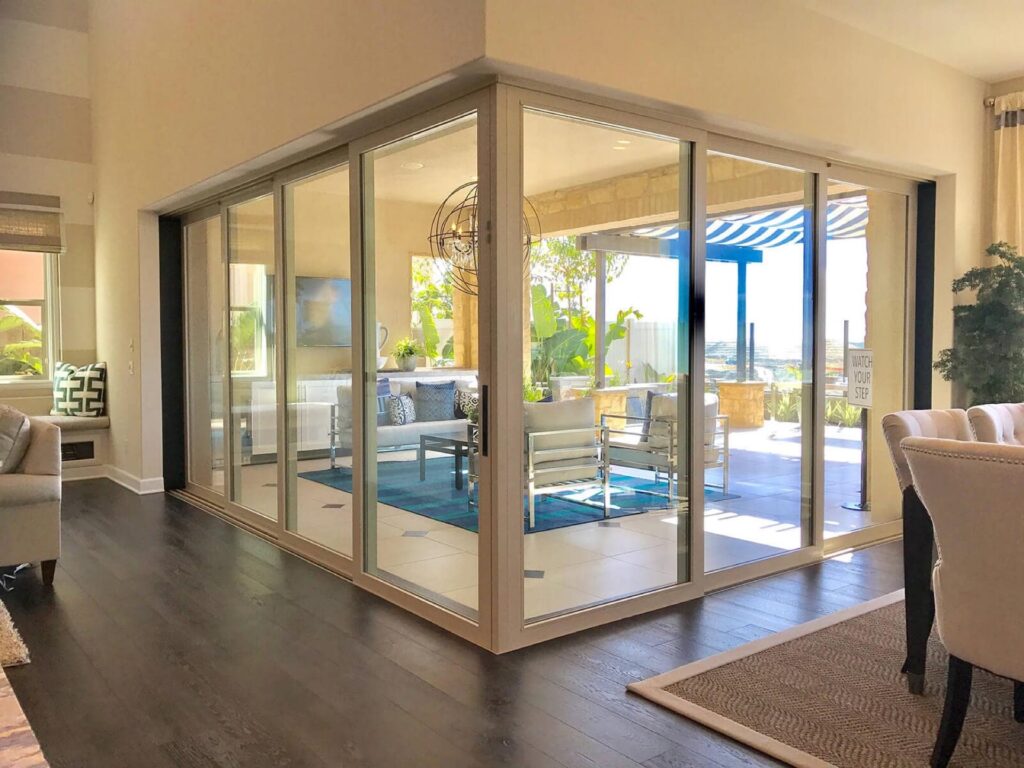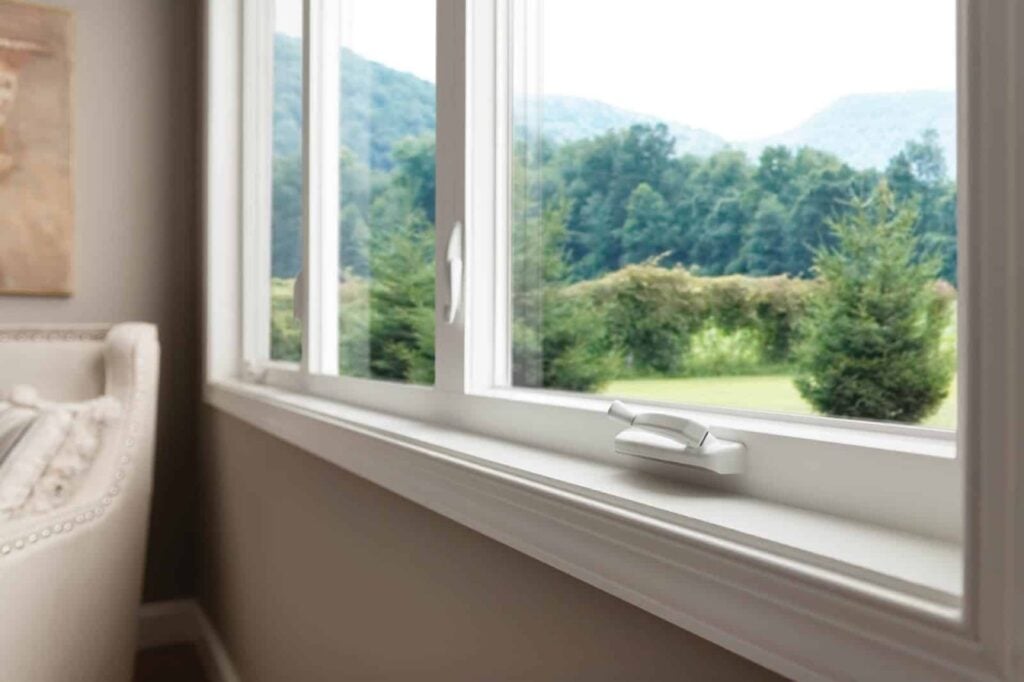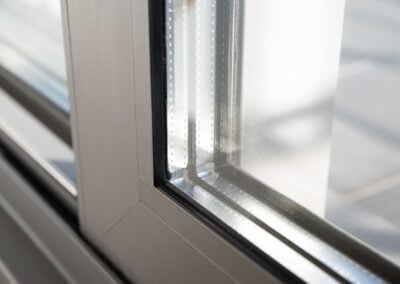Soundproof windows are designed to significantly reduce the transmission of noise from the outside environment into your home. This technology is especially critical in urban areas where noise pollution is a constant due to heavy traffic, construction, and other urban activities. Features such as triple-pane glass, laminated glass, and increased air space between panes create a barrier that helps block sound and enhance the quietness of your living space.
What Are Soundproof Windows?
Soundproof windows are specially designed replacement windows that reduce the amount of outside noise that enters your home. Unlike standard windows, soundproof windows use extra layers of glass, laminated panes, and wider air gaps to block and absorb sound.
It’s important to understand that soundproof windows don’t make your home completely silent. Instead, they significantly cut down on the level of outside noise, so everyday sounds like traffic or lawn equipment are less noticeable indoors. This makes them a popular choice for homeowners near busy streets, airports, or dense urban neighborhoods.
While double- and triple-pane windows already provide some natural sound reduction, soundproof windows go further by incorporating specialized glass and construction techniques. For homeowners who want a quieter, more comfortable living space, soundproof windows can be one of the most effective long-term solutions.
How Do Soundproof Windows Work?
To effectively reduce sound coming from external sources, soundproof windows incorporate advanced construction techniques that focus on three main areas: mass addition, airspace enhancement, and the use of specialized materials, like laminated glass. These features are critical in dampening everyday noise and providing a sound barrier against more persistent external disturbances.
Adding Mass With Thicker Glass
Soundproof windows work primarily by adding mass, which helps to dampen noise. Thicker panes of glass are a key component in this process. The extra thickness acts as a more substantial barrier against sound waves, significantly reducing the amount of noise that can pass through.
Industry-leading designs combine panes of dissimilar thickness. Because different glass thicknesses disrupt sound waves at different frequencies, this combination further reduces the amount of outside noise that enters the home. This approach can cut noise levels dramatically compared to standard dual-pane windows, especially for windows facing busy streets or other consistent noise sources.
Increasing Air Space Between Panes
Another critical feature of soundproof windows is the increased air space between panes. This space acts as an insulation layer that sound waves must travel through, further reducing noise levels. Dual-pane and triple-pane windows utilize this technology by creating multiple barriers of air and glass, which disrupt and weaken sound as it travels through.
Using Laminated Glass
Laminated glass is often used in soundproof window designs due to its excellent noise-cancelling properties. This type of glass incorporates a layer of plastic between two sheets of glass, creating a dense, flexible material that absorbs and blocks sound transmission. Laminated glass not only improves sound performance but also adds safety features by preventing the glass from shattering.
Providing Top-Quality Seals and Installation
Beyond the glass itself, tight window frames and high-quality seals are just as important for blocking sound. Even small gaps can let in outside noise. That’s why professional installation is crucial — a proper fit and airtight seal maximize the noise-reducing performance of soundproof windows.

Schedule a Free Consultation
Get a free home window inspection, talk with one of our design consultants to get product recommendations, and learn about special offers and financing.
What Are the Benefits of Soundproof Windows?
Soundproof windows provide much more than noise reduction. They combine comfort, efficiency, and durability, making them a valuable long-term upgrade for many homes.
- Noise reduction creates a quieter, more peaceful living environment by blocking much of the outside noise from traffic, airplanes, construction, or neighborhood activity.
- Improved comfort comes from eliminating constant background noise, which helps reduce stress, makes indoor spaces more enjoyable, and can even promote better sleep.
- Enhanced security is provided by laminated and thicker glass, which is much harder to break, adding protection against forced entry while also reducing outside noise.
- Increased home value comes from the combination of comfort, efficiency, and security, making properties more attractive to potential buyers in competitive markets.
- Customization options allow homeowners to add soundproofing where it is needed most, such as in bedrooms facing busy streets or home offices that require quiet.
- Low maintenance is supported by high-quality seals and construction that reduce drafts, condensation, and the need for frequent upkeep.
Are There Any Disadvantages to Soundproof Windows?
While soundproof windows offer many benefits, there are a few potential drawbacks to consider before investing in them. The most significant is the higher upfront cost compared to standard double- or triple-pane windows. Because they use thicker glass, laminated panes, and specialized construction, soundproof models can be more expensive, and some custom packages may also have longer lead times.
Another factor is that the heavier glass can require sturdier frames or professional reinforcement during installation. And while soundproof windows dramatically reduce noise, it’s important to note that no window can block 100% of sound— very loud or low-frequency noises may still be faintly heard. Finally, in already quiet neighborhoods, the extra investment may not deliver a noticeable improvement, making them less practical for some homeowners.
Not all windows block noise equally. The type of glass, number of panes, and available soundproofing upgrades make a big difference in how much outside sound you hear indoors.
Understanding STC ratings
Sound Transmission Class (STC) is the standard measure of how well a building material reduces airborne sound. The higher the number, the better the performance. For context:
- STC in the high 20s: normal speech can still be heard through the window.
- STC in the low-mid 30s: traffic and neighborhood noise are noticeably reduced.
- STC in the upper 30s or higher: most everyday sounds are blocked, though very loud or low-frequency noise may still be faintly audible.
Comparison of Common Window Types
Here’s how different window types compare based on their unique STC ratings.
| Type of Window | Description | Typical STC Rating |
| Single-pane windows | One layer of glass with minimal insulation, least effective at blocking noise. | ~27 |
| Double-pane windows | Two layers of glass with air or gas between, providing better insulation and modest noise reduction. | ~28-32 |
| Triple-pane windows | Three layers of glass that improve both energy efficiency and sound blocking. | ~33-35 |
| Dual-pane with sound package or laminated glass | Enhanced options using laminated glass or dissimilar thickness panes that disrupt more sound waves. | ~34-37 |
What This Means For Homeowners
For quieter neighborhoods, a quality dual- or triple-pane window may be enough. In busier areas, adding laminated glass or a sound package can make a noticeable difference without overpromising total silence. While no window blocks all noise, choosing the right configuration can greatly improve comfort.
How Much Do Soundproof Windows Cost?
Investing in soundproof windows involves understanding the costs associated with enhanced window glass and specialized installation requirements. The price for standard soundproof window installations can range from a few hundred to several thousand dollars per window, depending on the size and specific soundproofing features.
Installing Soundproof Windows in New vs. Existing Window Frames
Installing soundproof windows in new frames offers the advantage of designing the frame to accommodate specific soundproofing materials and techniques from the outset. This approach often allows for a more integrated window construction and potentially more effective noise reduction, especially when incorporating elements like thicker panes and air space optimization.
Retrofitting soundproof windows into existing frames can be more challenging. It requires careful consideration of the window opening size and the existing structure’s ability to support heavier glass panes. Installers might need to reinforce the frame or adjust the frame’s ability to accommodate the new window glass. Despite these challenges, retrofitting is a viable option for many homeowners, especially when complete window replacement is impractical or too costly.
Overall, whether integrating soundproof windows into new constructions or upgrading existing window frames, the investment can lead to significant improvements in noise reduction and overall home comfort. Improving acoustics and insulation make your home better for you, but those improvements contribute to your potential window investment ROI. Homeowners should consult with window manufacturer experts to ensure that their specific soundproofing needs are met effectively and within budget constraints. Leveraging professionals provides extensive benefits, including our Leak Armor Guarantee and Milgard’s warranty policy.
Soundproofing Solutions for Every Home
Different options, ranging from full soundproof window installations to simpler DIY methods, offer varying degrees of noise reduction to suit specific needs and environments. It is advisable to consult with a professional who can assess your particular situation, taking into account the noise levels and the available window manufacturer options, to ensure the best outcome. The team at Lake Washington Windows and Doors is here to assist you with any soundproofing projects. Contact us today to explore how we can help you achieve a quieter, more peaceful home environment.











